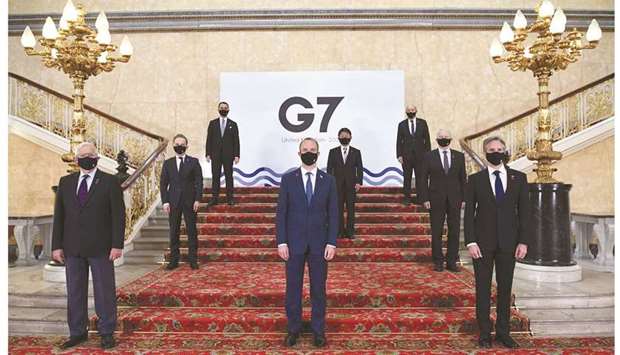The Group of Seven wealthy democracies yesterday discussed how to form a common front towards an increasingly assertive China in the foreign ministers’ first in-person talks in two years.
Backing US President Joe Biden’s calls for a deeper alliance of democracies, host Britain invited guests including India, South Korea and Australia for talks in central London stretched out over three days.
After a welcome dinner Monday focused on the nuclear programmes of Iran and North Korea, the foreign ministers opened formal talks at Lancaster House, a West End mansion, welcoming one another with Covid-friendly elbow-bumps and minimal staff.
The G7 devoted its first session yesterday to China, whose growing military and economic clout and willingness to exert its influence at home and abroad have increasingly unnerved Western democracies.
“It is not our purpose to try to contain China or to hold China down,” US Secretary of State Antony Blinken told reporters Monday.
“What we are trying to do is to uphold the international rules-based order that our countries have invested so much in over so many decades to the benefit, I would argue, not just of our own citizens, but of people around the world — including, by the way, China.”
Blinken pledged “robust co-operation” with Britain in pressuring China over the Xinjiang region, where Beijing’s incarceration of one million Uyghurs and other Muslims has been labelled genocide by Washington, and over a clampdown against civil rights in Hong Kong.
British Foreign Secretary Dominic Raab called for “holding Beijing to the commitments that they’ve made”, including on Hong Kong, which was promised a separate system before London handed over the colony in 1997.
But in line with the Biden administration, which has shifted the tone if not substance of former president Donald Trump’s hawkish stance on China, Raab also called for “finding constructive ways to work with China in a sensible and positive manner where that’s possible” — including on climate change.
“We want to see China stepping up to the plate and playing its full role,” Raab said.
The nations of the G7 — which also include Canada, France, Germany, Italy and Japan — mostly share concerns about China but some have different approaches.
Japan has historic tensions with China but has held off on joining Western nations with sanctions, wary of inflaming relations with its giant neighbour and trading partner.
Italy has been seen as one of the most Beijing-friendly nations in the West, in 2019 signing up for China’s massive infrastructure-building Belt and Road Initiative.
But Rome joined EU peers in March in summoning the Chinese ambassador in a row triggered by concerns over treatment of the Uyghurs.
One of Blinken’s predecessors as secretary of state, Hillary Clinton, said democracies needed to “put tremendous pressure on China in the court of public opinion”.
“I believe that it’s imperative that not just the Biden administration but all of our alliances, join together in making certain demands of China,” she told the Chatham House international affairs think-tank in London.
The foreign ministers later held a session on the spiralling crisis in Myanmar and were also due to discuss Russia, Libya, Syria, and climate change among other topics.
Blinken will head today to Ukraine in a show of support after Russia last month amassed and then pulled back 100,000 troops in border regions and Crimea.
EU foreign policy chief Josep Borrell said he spoke to Blinken about the latest round of talks in Vienna on returning the United States to an Iran nuclear deal trashed by former president Donald Trump.
Borrell called the negotiations “difficult” and welcomed the return of in-person diplomacy.
“In video conference you just read a paper. There is no interactivity,” Borrell said.
With in-person talks, “it’s the way you forge consensus; this is the way you forge agreements,” he said.
Britain also announced Wednesday that the G7 finance ministers will meet for the first time in person since the pandemic on June 4 and 5, again at Lancaster house.
Ministers are meeting under strict coronavirus protocols, with stripped-back delegations and social distancing, including face-masks and perspex screens between speakers.
The ministers today will discuss vaccines amid growing calls for Western nations to share after their early successes in inoculating their populations.

European High Representative of the Union for Foreign Affairs, Josep Borrell, German Foreign Affairs Minister Heiko Maas, Italy’s Foreign Minister Luigi Di Maio, Britain’s Foreign Secretary Dominic Raab, Japan’s Foreign Minister Toshimitsu Motegi, French Foreign Affairs Minister Jean-Yves Le Drian, Canada’s Foreign Affairs Minister Marc Garneau and US Secretary of State Antony Blinken pose for a family photo at Lancaster House at the start of the G7 foreign ministers meeting in London yesterday. (Reuters)
